Radiometric Study guides, Class notes & Summaries
Looking for the best study guides, study notes and summaries about Radiometric? On this page you'll find 198 study documents about Radiometric.
All 198 results
Sort by
 Popular
Popular
-
Animal Diversity 8th Edition By Hickman - Test Bank
- Exam (elaborations) • 363 pages • 2023
-
- $22.54
- 1x sold
- + learn more
Animal Diversity, 8e (Hickman) Chapter 1 Science of Zoology and Evolution of Animal Diversity 1) A characteristic of science is that A) it is not explained by natural laws. B) its hypotheses are testable. C) its conclusions are final. D) it is not falsifiable. E) it seeks to define the vitalistic forces of life. Answer: B Section: 01.01 Topic: Principles of Science Learning Objective: 01.01 Explain that science consists in testing, possibly rejecting, and improving our simplest and be...
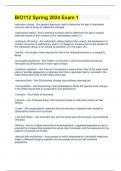
-
BIO112 Spring 2024 Exam 1 Terms
- Exam (elaborations) • 8 pages • 2024
-
- $11.49
- + learn more
radiometric dating ,radiocarbon dating,potassium-40 dating, half-life, punctuated equilibrium, Cambrian explosion, macroevolution, microevolution, Linnaeus, Lamarck,Cuvier,Lyell and Hutton,Malthus,descent with modification,selective breeding The process of humans intentionally selecting a few organisms with desired traits to serve as parents of the next generation, over time producing organisms with altered characteristics species a group of related organisms sharing a distinctive form. If se...
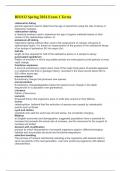
-
BIO112 Spring 2024 Exam 1 Terms
- Exam (elaborations) • 7 pages • 2024
-
- $10.99
- + learn more
BIO112 Spring 2024 Exam 1 Terms radiometric dating general approach used to determine the age of specimens using the rate of decay of radioactive isotopes radiocarbon dating a chemical analysis used to determine the age of organic materials based on their content of the radioisotope carbon-14 potassium-40 dating radiometric dating method often used in the assessment of volcanic intrusions in sedimentary layers. It is based on measurement of the product of the radioactive decay of an isot...
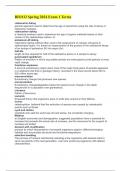
-
BIO112 Spring 2024 Exam 1 Terms
- Exam (elaborations) • 7 pages • 2024
-
- $11.39
- + learn more
BIO112 Spring 2024 Exam 1 Terms radiometric dating general approach used to determine the age of specimens using the rate of decay of radioactive isotopes radiocarbon dating a chemical analysis used to determine the age of organic materials based on their content of the radioisotope carbon-14 potassium-40 dating radiometric dating method often used in the assessment of volcanic intrusions in sedimentary layers. It is based on measurement of the product of the radioactive decay of an isot...
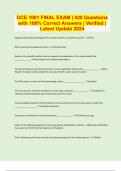
-
OCE 1001 FINAL EXAM | 420 Questions with 100% Correct Answers | Verified | Latest Update 2024
- Exam (elaborations) • 64 pages • 2024
- Available in package deal
-
- $15.49
- + learn more
Approximately what percentage of the surface of Earth is covered by oceans? - 71% Which ocean is the deepest on Earth? - Pacific Ocean Based on the scientific method, science supports the explanation of the natural world that _____________. - best explains all available observations The Age of Discovery was the time period in ocean exploration history when _____________. - the Western European world realized the vastness of Earth's water-covered surface The GPS system is a tool used for d...
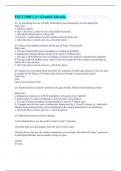
-
ESCI 1006 || A+ Graded Already.
- Exam (elaborations) • 23 pages • 2024
-
- $11.99
- + learn more
Q1: In calculating the size of Earth, Eratosthenes used assumption or knowledge that: Select one: a. Earth is a sphere b. Sun is far away, so that sun rays reach Earth in parallel c. Sun shone directly above a deep well d. Sun cast a slight shadow at some distance from the deep well e. All of the above correct answers e. All of the above Q1: There were multiple estimates for the age of Earth. They include: Select one: a. The age is about 6000 years according to a reading of the Bibl...
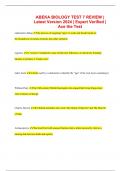
-
ABEKA BIOLOGY TEST 7 REVIEW | Latest Version 2024 | Expert Verified | Ace the Test
- Exam (elaborations) • 8 pages • 2024
- Available in package deal
-
- $8.49
- + learn more
radiometric dating the process of assigning "ages" to rocks and fossils based on the breakdown of certain elements into other elements eugenics a "science" founded by some of Darwin's followers, of selectively breeding humans to produce a "master race" index fossil a fossil used by evolutionists to identify the "age" of the rock layer containing it William Paley the 18th-century British theologian who argued that living things show clear evidence of design
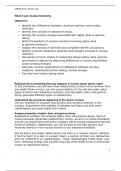
-
CHEM 120 Week 6 Virtual Lab; Nuclear Chemistry.
- Other • 11 pages • 2023
- Available in package deal
-
- $20.99
- + learn more
Week 6 Lab: Nuclear Chemistry Objectives: • Identify the differences between chemical reactions and nuclear reactions. • Identify the concept of radioactive decay. • Identify the nuclear changes associated with alpha, beta or gamma decay. • Write the products of nuclear reactions involving alpha, beta or gamma emissions. • Explain the concept of half-lives and complete half-life calculations. • Identify common subatomic particles and energies involved in nuclear reactions • ...
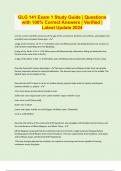
-
GLG 141 Exam 1 Study Guide | Questions with 100% Correct Answers | Verified | Latest Update 2024
- Exam (elaborations) • 11 pages • 2023
-
- $13.49
- + learn more
List the current scientific consensus of the age of the a) Universe, b) Earth, and c) Moon, and explain how scientists have calculated these ages - a) Age of the Universe: 13.77 +/- 0.04 billion years old (Measured by calculating how fast our universe is and has been expanding since the Big Bang) b) Age of the Earth: 4.54 +/- 0.05 billion years old (Measured by radiometric dating of meteorites that formed at the same time as Earth.) c) Age of the Moon: 4.425 +/- 0.025 billion years old (M...
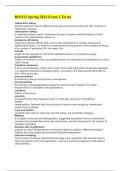
-
BIO112 Spring 2024 Exam 1 Terms
- Exam (elaborations) • 7 pages • 2024
-
- $10.98
- + learn more
BIO112 Spring 2024 Exam 1 Terms radiometric dating general approach used to determine the age of specimens using the rate of decay of radioactive isotopes radiocarbon dating a chemical analysis used to determine the age of organic materials based on their content of the radioisotope carbon-14 potassium-40 dating radiometric dating method often used in the assessment of volcanic intrusions in sedimentary layers. It is based on measurement of the product of the radioactive decay of an isot...
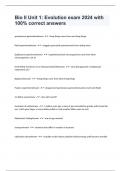
-
Bio II Unit 1: Evolution exam 2024 with 100% correct answers
- Exam (elaborations) • 9 pages • 2024
-
- $17.49
- + learn more
spontaneous generationAnswer - living things come from non-living things Redi experimentAnswer - maggots generated spontaneously from rotting meat Spallanzani experimentAnswer - hypothesized that microorganisms came from other microorganisms, not air broth killed vital forces of air that generated lifeAnswer - what did opponent of spallanzani experiment say? BiogenesisAnswer - living things come from other living things Pasteur experimentAnswer - disapproved spontaneous gene...

How much did you already spend on Stuvia? Imagine there are plenty more of you out there paying for study notes, but this time YOU are the seller. Ka-ching! Discover all about earning on Stuvia


